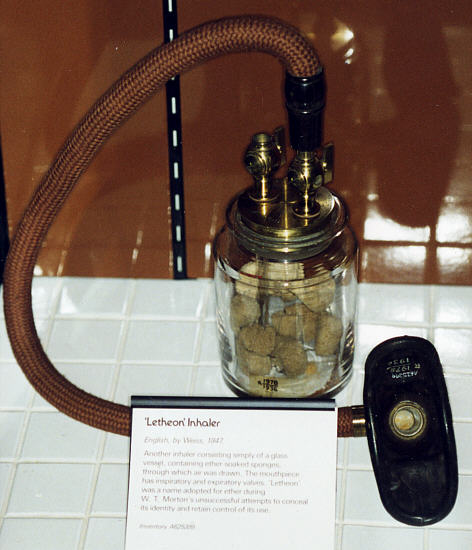"Letheon" Inhaler

Morton christened his ether inhaler "The Letheon". In classical Greek mythology,
the waters of the River Lethe expunged painful memories

On 17th October 1846, the day after Morton and Warren's success with Gilbert Abbot, another Massachusetts General Hospital surgeon, George Hayward (1791-1863), excised a fatty tumour from a woman's arm while she was insensible under ether. "The Letheon" was again administered by Morton. More ambitiously, on November 7th Dr Hayward amputated a leg. For several weeks Morton refused to disclose the composition of "Letheon". Morton and Professor Jackson were trying, in effect, to patent painless surgery. If they had succeeded, they would have become fabulously rich. Surgeons and patients made their objections clear. But once the unpatentable active ingredient was known, the progress of etherization was unstoppable. No less irresistibly, the adoption of surgical and obstetric chloroform swept around the globe too.Dissent wasn't silenced, just (mostly) disregarded. In Transactions of the American Medical Association, 1 (1848), the Committee on Surgery of The American Medical Association warned that use of anaesthesia could provoke "convulsions more or less severe and protracted, prolonged stupor, high cerebral excitement, alarming and long continued depression of vital powers, and asphyxia. As secondary effects, bronchitis, pneumonia, and inflammation of the brain." Pennsylvania Hospital initially prohibited the use of anaesthesia by it's doctors, "it being considered by the judicious surgeons in this institution as a remedy of doubtful safety"; but the ban was revoked in 1853. Critically, the sceptics were ill-organised. They lacked any unifying ideology. Opponents of the new painless surgery were powerless to stem the revolution. The need to rationalise surgical agony had passed.
In December 1846 anaesthetics were administered in London. By January they were used in Paris and other European capitals. In June they were adopted in Australia and soon in every country in the world. When "safe, sustainable and complete" technologies to eliminate emotional pain are discovered, they will quite possibly propagate at least as fast. Unfortunately, current agents tend to be "partial, occasional and dangerous". No "ideal pleasure drug" or super-soma yet exists. Sceptics claim that the existence of such wonderdrugs is forever impossible.
HOME
Search
Resources
Snapshots
William Morton
Utopian Surgery
Ether Inhaler (1867)
Refs and Further Reading
Anaesthesia and Anaesthetics